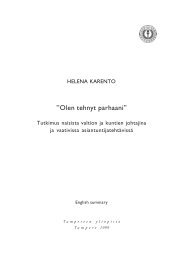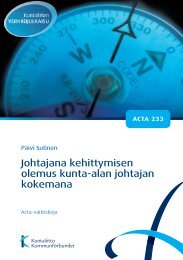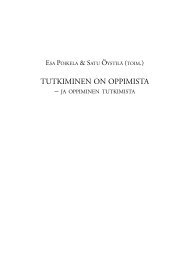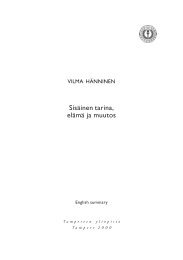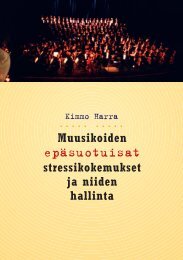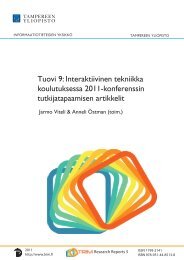Note on this edition: this is an electronic version of the 1999 book ...
Note on this edition: this is an electronic version of the 1999 book ...
Note on this edition: this is an electronic version of the 1999 book ...
Create successful ePaper yourself
Turn your PDF publications into a flip-book with our unique Google optimized e-Paper software.
Unravelling <strong>the</strong> Dem<strong>on</strong>ic Text 83in order to be what I do not think, in order for my thought to be what Iam not? 8The modern self, or subject, becomes a recent inventi<strong>on</strong> under <strong>th<strong>is</strong></strong> line<strong>of</strong> enquiry; “m<strong>an</strong>” becomes ficti<strong>on</strong> ra<strong>the</strong>r th<strong>an</strong> a neutral nominati<strong>on</strong> <strong>of</strong> afact. Equally, <strong>the</strong> author <strong>is</strong> <strong>an</strong> “ideological product” for Foucault, <strong>an</strong>d he env<strong>is</strong>i<strong>on</strong>sa future where <strong>the</strong> author-functi<strong>on</strong> d<strong>is</strong>appears <strong>an</strong>d <strong>the</strong> d<strong>is</strong>courses willdevelop in <strong>the</strong> “<strong>an</strong><strong>on</strong>ymity <strong>of</strong> a murmur.” 9 Th<strong>is</strong> d<strong>is</strong>soluti<strong>on</strong> <strong>of</strong> a unifiedspeaking subject <strong>an</strong>d its replacement by <strong>the</strong> plurality <strong>of</strong> <strong>an</strong><strong>on</strong>ymous voicespresents us with some <strong>of</strong> <strong>the</strong> central c<strong>on</strong>cerns <strong>of</strong> post-structural<strong>is</strong>m, butFoucault never developed a separate <strong>the</strong>ory <strong>of</strong> textuality. H<strong>is</strong> project <strong>is</strong>based <strong>on</strong> <strong>the</strong> heterogeneity <strong>an</strong>d ambiguity <strong>of</strong> power, <strong>on</strong> <strong>the</strong> multiplicity <strong>of</strong>forces that make it necessary for thought to address <strong>the</strong> “unthought” as itsfoundati<strong>on</strong>. The debate with Derrida clashed over <strong>the</strong> status <strong>of</strong> l<strong>an</strong>guage;whereas Foucault <strong>is</strong> oriented towards <strong>the</strong> social <strong>an</strong>d political realities thatmultiply l<strong>an</strong>guages, <strong>an</strong>d exclude some areas <strong>of</strong> subjectivity <strong>an</strong>d some peoplefrom <strong>the</strong> realm <strong>of</strong> d<strong>is</strong>cursive power, Derrida c<strong>on</strong>siders l<strong>an</strong>guage <strong>an</strong>d thoughtas inseparably intertwined. “By its essence, <strong>the</strong> sentence <strong>is</strong> normal,” Derridaargues: “if d<strong>is</strong>course <strong>an</strong>d philosophical communicati<strong>on</strong> (that <strong>is</strong>, l<strong>an</strong>guage itself)are to have <strong>an</strong> intelligible me<strong>an</strong>ing, that <strong>is</strong> to say, if <strong>the</strong>y are to c<strong>on</strong>formin <strong>the</strong>ir essence <strong>an</strong>d vocati<strong>on</strong> as d<strong>is</strong>course, <strong>the</strong>y must simult<strong>an</strong>eously in fact<strong>an</strong>d in principle escape madness.” 10 Foucault maintains that it <strong>is</strong> possible tobe ins<strong>an</strong>e <strong>an</strong>d still have access to l<strong>an</strong>guage (h<strong>is</strong> literary examples includeHölderlin, Nerval, Nietzsche <strong>an</strong>d Artaud). 11 Instead <strong>of</strong> some (tr<strong>an</strong>scendental)essence <strong>of</strong> d<strong>is</strong>course <strong>an</strong>d thought, Foucault <strong>is</strong> interested in actual d<strong>is</strong>cursiveheterogeneity <strong>an</strong>d multiplicity, <strong>an</strong>d in <strong>the</strong> m<strong>on</strong>ological attempts to reduce<strong>the</strong> subject <strong>of</strong> enunciati<strong>on</strong> into some essence <strong>of</strong> rati<strong>on</strong>ality. 12 Derrida,in Foucault’s view, was c<strong>on</strong>tinuing Descartes’s work in abstracting subjectivityfrom h<strong>is</strong>torical or corporeal determin<strong>an</strong>ts, <strong>an</strong>d was <strong>on</strong>ly interested inprotecting <strong>the</strong> scholarly <strong>an</strong>d limitless “sovereignty which allows it [<strong>the</strong> master’svoice] to restate <strong>the</strong> text indefinitely.” 13 The subject <strong>of</strong> <strong>th<strong>is</strong></strong> intellectual8Foucault 1966/1989, 324-25.9 Foucault 1969/1989, 159-60.10 Derrida, “Cogito <strong>an</strong>d <strong>the</strong> H<strong>is</strong>tory <strong>of</strong> Madness” (1968/1978, 53-4).11 Foucault 1988, 278.12 “Au milieu du m<strong>on</strong>de serein de la maladie mentale, l’homme moderne ne communiqueplus avec le fou […]. Le l<strong>an</strong>gage de la psychiatrie, qui est m<strong>on</strong>ologue de la ra<strong>is</strong><strong>on</strong> surla folie, n’a pu s’établir que sur un tel silence.” (Foucault 1961, II.)13 Foucault, “M<strong>on</strong> corps, ce papier, ce feu” (1972; Foucault 1979, 27; 1961/1979, 602).– The d<strong>is</strong>pute has extended in its numerous commentaries. Bernard Flynn (1989) favoursDerrida’s view <strong>an</strong>d maintains that Foucault has mixed something that he thought was ah<strong>is</strong>torical process with <strong>the</strong> general principle at work in l<strong>an</strong>guage as such (<strong>the</strong> exclusi<strong>on</strong> <strong>of</strong>unreas<strong>on</strong>). John Frow (1986, 213) character<strong>is</strong>es <strong>the</strong> c<strong>on</strong>fr<strong>on</strong>tati<strong>on</strong> as a clash between amore complex <strong>an</strong>d more straightforward views <strong>on</strong> textuality; he claims that Derrida’s way<strong>of</strong> reading <strong>is</strong> no more “natural” or right th<strong>an</strong> Foucault’s, but he adm<strong>on</strong><strong>is</strong>hes Foucault forc<strong>on</strong>fusing <strong>the</strong> d<strong>is</strong>cursive subject with <strong>the</strong> empirical, speaking subjects. Robert D’Amico(1984) has seen in <strong>th<strong>is</strong></strong> encounter a show-down between h<strong>is</strong>toric<strong>is</strong>m <strong>an</strong>d hermeneutics.Shosh<strong>an</strong>a Felm<strong>an</strong> (1978/1985, 54) <strong>is</strong> perhaps most perceptive in her interpretati<strong>on</strong> that



